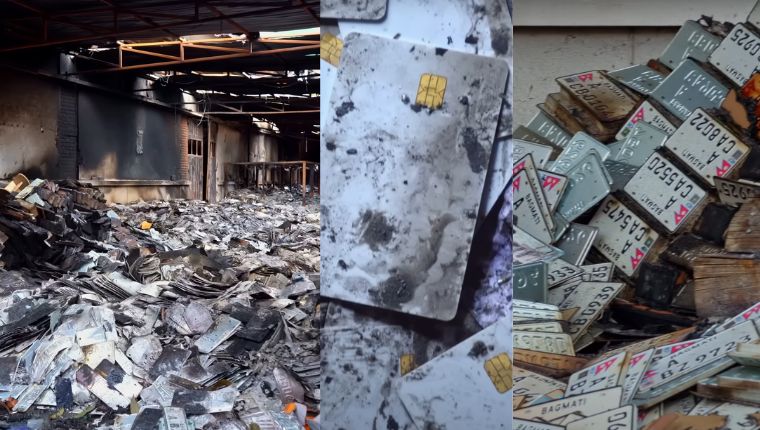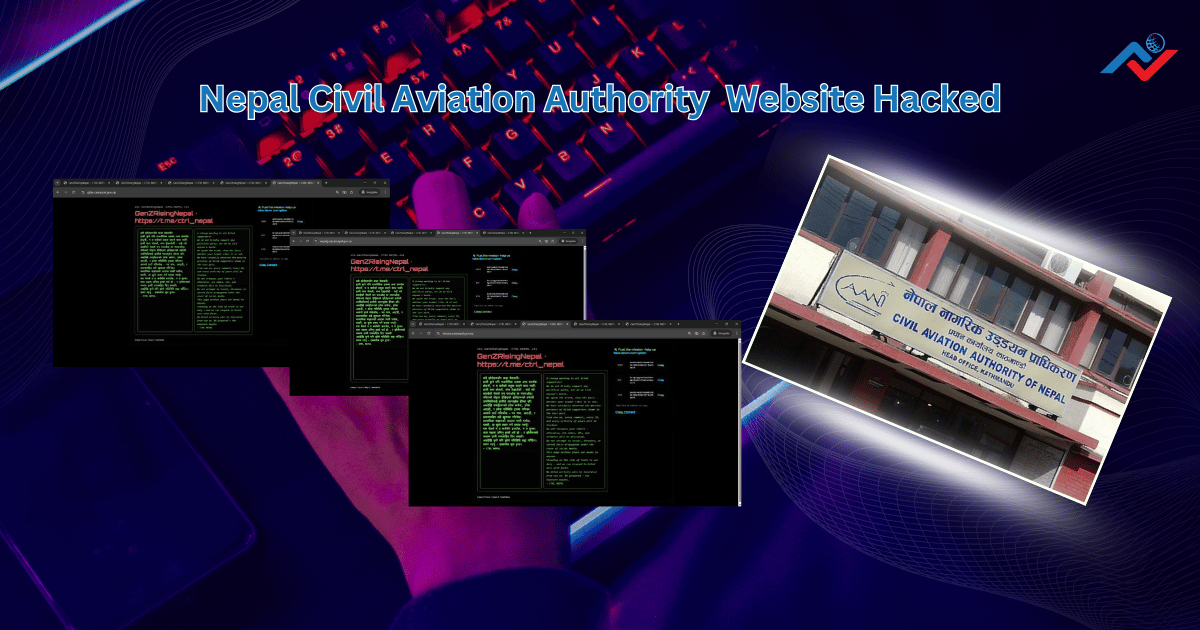Kathmandu — In a devastating blow to public services, the Nepal Transport Department server theft incident has left the department’s operations completely paralyzed for over a month. Following the arson attack and vandalism during GenZ protests on September 9 (Bhadra 24), the Department of Transport Management has been unable to provide any services to citizens, creating unprecedented disruption for thousands of Nepalis.
The Nepal Transport Department server theft occurred when protesters targeted the department’s central server during demonstrations, resulting in not only physical destruction of property but also the theft of critical hard drives containing sensitive citizen data. This catastrophic incident has raised serious questions about data security, service continuity, and the vulnerability of government digital infrastructure.
Understanding the Scale of Nepal Transport Department Server Theft
What Was Lost in the Attack?
The Nepal Transport Department server theft resulted in the loss of crucial hardware components from the department’s data center. According to Computer Engineer Bhanubhakta Joshi from the department, out of four servers that were housed in the facility, hard drives from two servers were completely stolen during the chaos.
The stolen hard drives contained:
- Biographical data: Names, citizenship numbers, addresses
- Biometric information: Fingerprints, photographs, signatures
- Service records: License applications, renewals, vehicle registrations
- Transaction histories: Payment records and service histories
This Nepal Transport Department server theft represents one of the most significant data security breaches in Nepal’s government sector, affecting potentially millions of citizens whose personal information was stored in the department’s databases.
Physical Damage Beyond the Server Theft
While the Nepal Transport Department server theft grabbed headlines, the physical destruction to the building and equipment was equally severe. Department spokesperson Ganesh Man Rai confirmed that the building suffered extensive damage during the arson attack, requiring comprehensive repairs before normal operations can resume.
Currently, department staff are working from a temporary structure set up within the office premises, attempting to restore services with whatever resources remain available.
Impact of Nepal Transport Department Server Theft on Public Services
Services Currently Unavailable
The Nepal Transport Department server theft and subsequent damage have brought the following services to a complete halt:
- Website Operations: The department’s website remains offline as it was hosted on the now-damaged data center
- License Renewals: Citizens cannot renew their driving licenses through any channel
- New License Applications: Processing of new driving license applications has stopped entirely
- License Printing: Even if applications were processed, the printing facility is non-operational
- Vehicle Registration: Registration and transfer services are unavailable
- Online Services: All digital portals and e-services remain inaccessible
According to Nepal’s transport regulations, these services are essential for millions of Nepalis, making the Nepal Transport Department server theft impact particularly severe.
Recovery Timeline: When Will Services Resume?
Short-Term Solutions (10-15 Days)
Computer Engineer Joshi provided insights into the recovery timeline following the Nepal Transport Department server theft. He indicated that some services might become operational within 10 to 12 days, though with significant limitations.
Immediate Recovery Efforts Include:
- Assembling remaining server components at the Government Integrated Data Center (GIDC)
- Utilizing backup data to recover essential databases
- Borrowing scan storage equipment from the Security Printing Center
- Testing remaining hardware for functionality
However, Joshi cautioned that there’s no certainty whether the reassembled servers will function properly until thorough testing is completed.
Medium-Term Challenges (Weeks to Months)
The Nepal Transport Department server theft has created longer-term challenges that may take weeks or months to fully resolve:
License Printing Complications: The department’s license printing machines, imported from Italy, suffered damage during the vandalism. While not destroyed in the fire, these specialized printers require assessment by engineers from the manufacturing company before their operational status can be determined.
Engineer Joshi explained: “We need to bring in engineers from the printer manufacturing company to conduct a thorough assessment before we know whether these printers can be operated again.”
Smart Card Concerns: The department still has smart card stock for license printing, but there are concerns about the functionality of the embedded chips. These cards require storage at controlled temperatures (23-24°C) in air-conditioned environments. The heat from the fire may have damaged the chips, though this cannot be confirmed until the printers are operational.
Long-Term Solutions (Months)
Addressing the full impact of the Nepal Transport Department server theft will require:
- New Server Procurement: Following government procurement procedures, which typically take several months
- Replacement Printers: The department is preparing to issue tenders for new printing equipment
- Smart Card Acquisition: New cards with functional chips will need to be procured
- Data Center Reconstruction: Complete rebuilding of secure data storage facilities
- Enhanced Security Measures: Implementation of better physical and digital security protocols
Data Security Nightmare: The Hidden Crisis in Nepal Transport Department Server Theft
Biometric Data at Risk
Perhaps the most alarming aspect of the Nepal Transport Department server theft is the potential for data misuse. The stolen hard drives contain comprehensive personal information of service recipients, including sensitive biometric data.
Engineer Joshi expressed serious concerns: “It seems like someone with technical knowledge carried out this theft. Data from the hard drives can be extracted, and there’s a real danger that this data could be sold.”
What Data Could Be Compromised?
The Nepal Transport Department server theft potentially exposed:
Personal Information:
- Full names and addresses
- Citizenship numbers
- Date of birth information
- Contact details
- Family member information
Biometric Data:
- Digital fingerprints
- High-resolution photographs
- Scanned signatures
- Retinal scans (if applicable)
Service Records:
- Driving license categories and restrictions
- Traffic violation records
- Vehicle ownership information
- Payment and transaction histories
Potential Misuse Scenarios
Security experts warn that data from the Nepal Transport Department server theft could be misused for:
- Identity Theft: Creating fake documents using genuine biometric data
- Financial Fraud: Opening bank accounts or obtaining credit using stolen identities
- Dark Web Sales: Selling comprehensive identity packages to criminal networks
- Targeted Scams: Using personal information for sophisticated phishing attempts
- Blackmail: Leveraging sensitive personal information against individuals
According to cybersecurity best practices, stolen government databases pose significant national security risks and can remain valuable to criminals for years.
Government Response to Nepal Transport Department Server Theft
Immediate Actions Taken
Following the Nepal Transport Department server theft, the department has initiated several emergency measures:
Technical Recovery:
- Working intensively to restore services using available resources
- Collaborating with GIDC to reassemble system infrastructure
- Utilizing backup data for system recovery
- Testing remaining hardware components
Resource Management:
- Borrowing equipment from other government agencies
- Prioritizing critical services for early restoration
- Adapting operations to work with limited server capacity
Challenges in Government Procurement
Engineer Joshi highlighted a critical challenge in responding to the Nepal Transport Department server theft: “Government procurement procedures take time. That’s why we’re trying to restore services quickly using whatever servers we have available.”
This bureaucratic reality means that despite the urgency created by the Nepal Transport Department server theft, acquiring new equipment through official channels will require:
- Budget allocation approvals
- Tender documentation preparation
- Public bidding periods
- Evaluation procedures
- Contract finalization
These processes, while necessary for transparency, can take months to complete, extending the service disruption period.
Public Impact: Real Stories from Affected Citizens
License Renewal Delays
The Nepal Transport Department server theft has created significant hardships for citizens. Thousands of people with expiring licenses find themselves unable to renew them legally, potentially facing:
- Legal complications if driving with expired licenses
- Insurance claim issues in case of accidents
- Professional difficulties for those who need valid licenses for employment
- Inability to update license categories or information
New Applicants in Limbo
Young people who recently passed their driving tests before the Nepal Transport Department server theft now face indefinite waits for their licenses. This affects:
- Job opportunities requiring valid driving licenses
- Personal mobility and independence
- Educational programs with driving requirements
- Commercial driver training completion
Business Sector Concerns
The Nepal Transport Department server theft has also impacted businesses:
- Transport companies unable to register new vehicles
- Rental services unable to process necessary documentation
- Logistics firms facing operational constraints
- Insurance companies unable to verify license validity
Lessons from Nepal Transport Department Server Theft
Infrastructure Vulnerabilities Exposed
The Nepal Transport Department server theft has starkly revealed vulnerabilities in government digital infrastructure:
Physical Security Gaps:
- Inadequate protection of critical data centers
- Insufficient building security during civil unrest
- Lack of segregated, secure facilities for sensitive equipment
Digital Preparedness Issues:
- No off-site backup facilities
- Absence of redundant systems
- Limited disaster recovery protocols
- Inadequate data security measures
Need for Modernization
Experts argue that the Nepal Transport Department server theft highlights the urgent need for:
- Cloud-Based Solutions: Reducing dependence on physical servers vulnerable to such attacks
- Distributed Systems: Preventing single points of failure
- Enhanced Encryption: Protecting data even if physical media is stolen
- Regular Off-Site Backups: Ensuring service continuity regardless of local damage
- Advanced Security Protocols: Including biometric access controls and surveillance systems
According to international best practices for government data security, critical infrastructure should have multiple redundancy layers and disaster recovery capabilities.
Comparative Analysis: Similar Incidents Globally
International Precedents
While the Nepal Transport Department server theft is particularly severe, similar incidents have occurred globally:
Ransomware Attacks: Multiple government agencies worldwide have faced digital attacks that paralyzed services, though typically without physical theft of equipment.
Civil Unrest Damage: Government facilities in various countries have suffered damage during protests, but few cases involve the theft of server hard drives with sensitive data.
Data Breaches: Many government agencies have experienced data breaches, but usually through digital means rather than physical theft following arson.
The Nepal Transport Department server theft represents a unique combination of physical destruction, equipment theft, and data security breach, making it an unprecedented case study in government infrastructure vulnerability.
Moving Forward: Rebuilding After Nepal Transport Department Server Theft
Immediate Priorities
As recovery from the Nepal Transport Department server theft continues, the department faces several priorities:
Service Restoration:
- Bringing essential services back online as quickly as possible
- Implementing temporary solutions for urgent cases
- Communicating clearly with the public about timelines
Security Enhancement:
- Investigating the theft thoroughly
- Implementing improved security measures
- Protecting remaining equipment and data
Data Protection:
- Assessing the full extent of compromised data
- Alerting affected citizens about potential risks
- Implementing monitoring systems to detect misuse
Long-Term Reforms Needed
The Nepal Transport Department server theft should catalyze comprehensive reforms:
- Digital Transformation: Adopting modern, secure, cloud-based systems
- Redundancy Planning: Creating backup facilities and systems
- Security Investment: Upgrading physical and digital security infrastructure
- Staff Training: Improving technical capacity and security awareness
- Policy Development: Creating robust data protection and disaster recovery policies
What Citizens Should Do Following Nepal Transport Department Server Theft
Immediate Actions
If your data may have been affected by the Nepal Transport Department server theft, consider:
Monitor Your Identity:
- Watch for unusual activities on your accounts
- Be alert to suspicious calls or messages claiming to be from government agencies
- Review your credit reports regularly
- Set up alerts for new account openings in your name
Update Security:
- Change passwords on important accounts
- Enable two-factor authentication where possible
- Be cautious about sharing personal information
- Report any suspected misuse immediately
Stay Informed:
- Follow official announcements from the Department of Transport Management
- Check reliable news sources for updates on service restoration
- Verify information through official channels before acting on it
Rights and Advocacy
Citizens affected by the Nepal Transport Department server theft should:
- Demand transparency about data breaches
- Request information about what specific data was compromised
- Advocate for better government data security
- Support calls for modernization of government digital infrastructure
Expert Opinions on Nepal Transport Department Server Theft
Cybersecurity Perspectives
Cybersecurity experts view the Nepal Transport Department server theft as a wake-up call for government agencies across Nepal. The incident demonstrates that:
- Physical security is as important as digital security
- Government data requires military-grade protection
- Single-location storage is inherently risky
- Regular security audits are essential
Political Implications
The Nepal Transport Department server theft has also sparked political discussions about:
- Government preparedness for civil unrest
- Protection of critical infrastructure during protests
- Accountability for security failures
- Investment priorities in government services
Conclusion: A Turning Point for Digital Governance in Nepal
The Nepal Transport Department server theft represents more than just a temporary service disruption—it’s a critical moment that exposes fundamental vulnerabilities in Nepal’s government digital infrastructure. As the department works to restore services over the coming weeks and months, the incident should serve as a catalyst for comprehensive reform.
For the millions of Nepalis affected by the Nepal Transport Department server theft, the immediate concern is when services will resume. Engineer Joshi’s cautious optimism suggests some services may return within two weeks, but full restoration could take months. The printing of new licenses appears to be the furthest away from resumption, depending on the assessment of damaged Italian-made printers and the condition of smart card chips.
Beyond service restoration, the Nepal Transport Department server theft raises urgent questions about data security. With sensitive biometric and personal information of countless citizens potentially in the hands of thieves, the incident demands serious attention to protecting digital identity in Nepal.
As the department navigates recovery, one thing is clear: the Nepal Transport Department server theft has changed the conversation about government digital infrastructure in Nepal. The question now is whether this painful lesson will lead to the comprehensive reforms needed to prevent such incidents in the future and protect citizen data in an increasingly digital world.
Citizens seeking updates on service restoration should monitor official announcements from the Department of Transport Management and prepare for what may be an extended period of service disruption as the government works to recover from this unprecedented Nepal Transport Department server theft.
Also Read
Gen Z Luxury Brand Boycott: How Young Consumers Are Ditching Expensive Brands in 2025
Nepal Private Sector Rises Strongly From Gen-Z Protest Destruction


![Nepal Voter Registration Now Possible at Any Election Office – Complete Guide [2025 updated]](https://nepaliict.com/wp-content/uploads/2025/10/Nepal-voter-registration.jpg)





















Comments